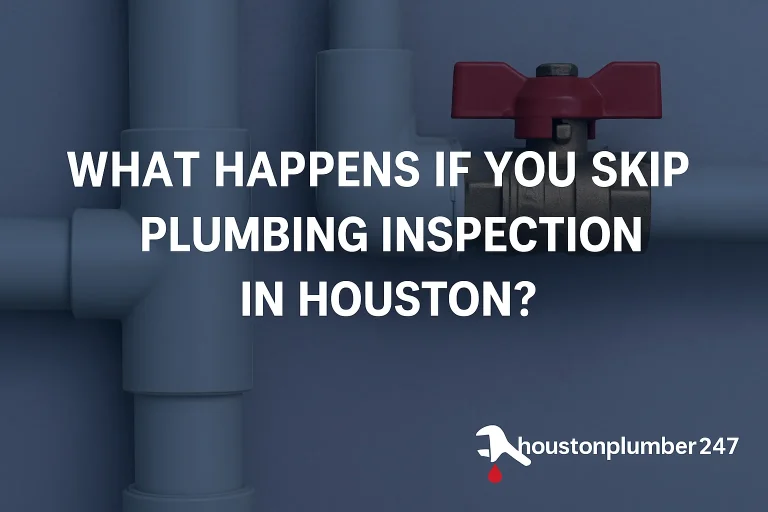What Happens If You Skip a Plumbing Inspection in Houston?
Home » What Happens If You Skip a Plumbing Inspection in Houston?
If you live in Houston, TX and skip a plumbing inspection, you could face serious and expensive problems. What seems like a small hidden leak today can turn into a full-blown slab leak tomorrow—damaging your floors, walls, and even the foundation of your home. In a city like Houston—where soil movement, high humidity, and aging homes put extra stress on plumbing systems—ignoring inspections means putting yourself at risk for mold, corrosion, flooding, and emergency repairs that can drain thousands of dollars from your pocket.
The worst part? Most of this damage starts quietly. By the time you notice something’s wrong, it’s often too late—and the water has already done its damage beneath your feet.
Let’s take a closer look at what really happens when you skip a plumbing inspection—and why it’s one of the most overlooked, yet critical steps in protecting your home

Hidden Damage Caused by Skipping a Plumbing Inspection
Many plumbing problems don’t become visible until they reach an extreme level. A plumber’s routine inspection can catch these issues early. But if you skip the inspection and don’t take things seriously, you might miss problems like:
1. Slab Leaks
Most homes in Houston are built on concrete slabs. If a pipe underneath that slab starts leaking, it can become a major issue. You won’t hear it or immediately see signs that something’s wrong. But over time, the leaking water weakens the soil beneath the foundation, leading to shifting, cracks, and serious structural damage.
2. Mold Growth
Leaks inside walls or under floors create a moist, hidden environment. And as we all know, Houston’s humid climate allows mold to grow quickly. It can damage drywall, carpets, and wood—and the scariest part is that it can also affect your health, especially if you have allergies or asthma.
3. Corrosion and Rust
Old or untreated pipes can corrode over time, resulting in rusty water, slow leaks, or total pipe failure. If this happens in your main water line, your entire home could lose its water supply—or worse, flood.
These problems are often invisible to the eye. For example, you might not see water on the floor, but behind the walls or under the ground, the damage is getting worse every day.
Real Example from Houston: A Costly Case Study
Back in early 2023, a family living in the Westbury area of Houston began noticing a faint damp smell in their home. But they didn’t pay much attention to it. Simply put, they delayed getting a plumbing inspection—thinking it probably wasn’t necessary at the time.
A few months later, their water bill started to double. Then, cracks began to appear in their tile flooring. Frustrated, they finally called for a professional plumbing inspection—only to find out there had been a slab leak going on for months, slowly washing away the soil beneath their foundation.
Here’s what the repairs ended up costing:
- $3,000 for detecting the slab leak and rerouting the pipes
- $7,500 for stabilizing the foundation
- $2,200 for mold removal
- $2,000+ for replacing the damaged flooring
Total cost: Over $14,000—plus weeks of stress, disruption, and wasted time.
If they had just spent $250 on an inspection earlier, the leak could’ve been caught early—and they could’ve saved their money, time, and peace of mind
Cost Comparison: Skipping vs. Getting a Plumbing Inspection
Many people skip plumbing inspections because they want to save money. But in most cases, skipping the inspection leads to much higher costs. Here’s a comparison to help you see the difference:
| Item | Average Cost |
| Routine Plumbing Inspection | $150 – $350 |
| Fixing a Minor Leak | $200 – $600 |
| Fixing a Slab Leak | $2,000 – $6,000 |
| Mold Removal | $1,500 – $5,000 |
| Foundation Repairs | $5,000 – $12,000+ |
| Replacing Water-Damaged Flooring | $2,000 – $5,000 |
When Skipping Plumbing Inspections Is Most Dangerous
Some situations make plumbing inspections even more important. If your home falls into any of the following categories, skipping an inspection could be especially risky:
1. Older Homes
If your home is 30 to 40 years old or more, your pipes may already be corroding, cracked, or not up to current standards. Older plumbing systems often use materials like galvanized steel or cast iron, which wear out over time.
2. Post-Storm or Flooding Events
Houston is no stranger to storms, hurricanes, and flooding. Heavy rain and rising groundwater can stress your plumbing system. Shifting soil and water pressure changes increase the risk of leaks and pipe failures.
3. Seasonal Temperature Swings
In winter, especially when rare freezes hit Houston, pipes can freeze and crack. In summer, expanding soil can pull pipes apart. Inspections help you stay ahead of seasonal damage.
4. Before Buying or Selling a Home
If you’re buying a home, an inspection gives you peace of mind. If you’re selling, it helps prove your plumbing is in good shape and avoids last-minute negotiations.
5. Unusual Water Bills or Low Pressure
Even if your plumbing looks fine, signs like higher water bills or weak water flow could mean a hidden issue. Ignoring these clues without an inspection is a gamble.
How Plumbing Inspections Help Prevent Bigger Problems?
A professional plumbing inspection is more than just looking at pipes. It’s a full check-up for your home’s water system. Here’s what a typical inspection includes:
- Checking all visible and hidden pipes for leaks or damage
- Inspecting water pressure and flow rate in fixtures
- Looking at the water heater for safety, rust, or buildup
- Scanning for signs of corrosion or pipe weakness
- Testing drains for blockages or slow flow
- Inspecting outdoor plumbing and irrigation lines
These inspections help detect small problems before they turn into big ones. They give you time to plan repairs—on your terms and budget.
Why Houston Homes Are Especially at Risk?
Houston’s unique climate and soil conditions make plumbing issues more likely to develop if ignored. Here’s why inspections are especially important in this region:
- Expansive clay soil under Houston homes expands and contracts with moisture, stressing underground pipes
- High humidity encourages mold growth from even small leaks
- Aging neighborhoods like Meyerland, Garden Oaks, and Sharpstown often have original plumbing systems
- Stormwater backups are more common, putting extra strain on home drainage and sewer systems
If you live in Houston, your plumbing works harder than it would in many other cities. Regular inspections are a way to stay ahead of the game.
Don’t Wait Until It’s Too Late
Skipping a plumbing inspection might save a little money today, but it can cost you thousands tomorrow. The damage caused by hidden leaks, mold, and corroded pipes builds silently and quickly. Regular inspections give you peace of mind, reduce emergency repair costs, and protect your home’s value.
Houston homeowners, especially those in older homes or storm-prone areas, should schedule inspections at least once every 1–2 years—or more often if they notice water pressure changes, damp smells, or high utility bills.
Schedule Your Plumbing Inspection in Houston Today
Your plumbing works behind the scenes every day. But when it breaks down, the damage is front and center. Don’t let a preventable problem turn into a disaster.
👉 Call (281) 767-9932 now to schedule a thorough plumbing inspection anywhere in Houston.
Your home deserves attention before problems happen—not after.
Want to learn more? Visit our main page for Plumbing Inspection Services in Houston to see what’s included and why local homeowners trust us year-round.

